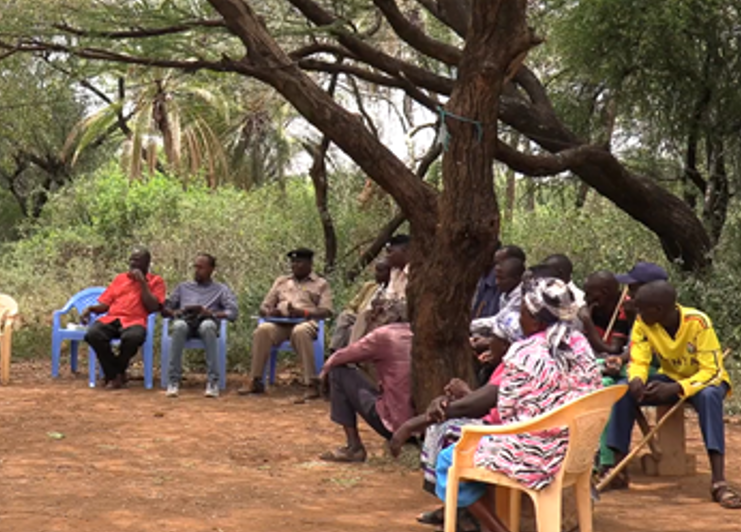Creating epicentres for peace in the North Rift Region in Kenya

“We are in great pain, having lost our children and our property. We are living in shadows and going around in shadows. If you go to other places now, people are farming, have you seen any farm here? All of these are farms, but lack of peace has restricted us from doing any of that, we sit here staring at each other.” -Resident in Kapedo
Despite numerous mediation efforts, peace has remained elusive in the Kerio and Suguta valley of North Rift region, likely due to the noninvolvement of the communities in the identification of conflict sources, community resilience factors, as well as in the development and implementation of solutions.
It is against this background that Interpeace and the National Cohesion and Integration Commission (NCIC) began the implementation of the programme Strengthening Community Resilience for Sustainable Peace in Selected Fragile Counties in Devolved Kenya.
The programme adapted the participatory action research (PAR) methodology, and has since 2019 helped communities turn conflict-prone zones into epicentres of peace by engaging communities in formulating strategies on how they can be empowered in developing and implementing solutions on how to resolve conflict.
Creating spaces for peace along the Kapedo-Lomelo corridor
The valley of Suguta, known as the ‘valley of death’, had become synonymous with violence, grieving, and loss caused by cattle raids, pillage, or massacres. As violence spiralled between the Turkana and Pokot communities, local police recorded an average of six deaths and three livestock raids every month prior to 2021. Villages along the Chemolingot- Lokori corridor have become synonymous with bloody conflict, grieving, and loss. Escalatory cycles of violence have drawn extended ethic affinity networks into the fray, embedding animosities and fear, as the Pokot and Turkana clans have become locked in a battle for survival against each other.
In this area young pastoralists openly carried AK-47s as they herded flocks of camels, cows, and goats. These conditions rapidly created social and economic paralysis. Roads were closed, schools, businesses, and markets shuttered as a precaution and from panic.
Historically the communities in the Kapedo-Lomelo route along the Chemolingot- Lokori corridor have been strong enemies and even meeting each other was a tall order. Commerce was effectively disabled, and informal territorial no-go zones emerged.
Interpeace and its partner NCIC held multiple community dialogues to understand the challenges and grievances of both clans, as well as the exploring the benefits to erring on the side of peace. In the community dialogues, conflict parties arrived at a consensus not only in the urgent need to achieve peace, but also to agree on concrete solutions on how to sustain it.
In July 2021, Pokot and Turkana elders signed the Orwa Peace Accord, putting an end to decades of cyclical conflict and deadly violence. Before Orwa, many peace agreements signed in the North Rift had broken down, because they were not implemented or could not be transferred from the negotiating ‘table’ to the ‘town-square’. The accord put an end to decades of cyclical conflict and deadly violence, was possible due to the willingness and commitment of communities to share a new future together.
Most importantly, the 2021 Accord, designed by both clans, continues to affirm that sustainable peace is the responsibility – led and protected – by the communities.
Ceasefire monitoring committees: Ensuring self-sustaining shifts towards peace
The Tugen communities of Baringo east as well as the Ilchamus and Pokot communities in Mukutani have been tied in conflict for decades. The warring communities were not interacting with each other, creating a vacuum of fear and suspicion among them, which further exacerbated the tensions between the communities.
Since 2020, Interpeace and NCIC have been bringing the elders together to discuss on conflict as well as insecurity facing them. These engagements instilled reason in their minds thus accepting to meeting their counterparts for peaceful discussions. The partner organizations have also been engaging respective community elders on rigorous discsussions around having inter-community peace talks.
In March 2020 members of the Pokot, Tugen, Ilchamus, Turkana and Samburu communities participated in formation of community lead peace infrastructure- Ceasefire Monitoring Committees (CMCs) that spearheaded the ceasefire across the North Rift region.
CMCs create the conditions to transform conflict. They seek to identify and mitigate the key triggers of fear and mistrust that create inter-community hostility. In addition, members of the CMCs work with communities to ensure that local militias keep away guns, ensure that displaced persons return home, initiate and facilitate dialogue, and enhance social cohesion. The CMCs work to restore trust, nurture a culture of peace and reconciliation, and address structural issues that often trigger conflict in the communities.
When a conflict incident or crime occurs, members of the CMC from both clans show up on the spot, to interact with affected villagers, who can engage in their own language with an elder they trust. This inter-clan collaboration reduces fear, particularly when opposing clan members are involved in a skirmish or suspect one another of a crime. CMCs offer multi-dimensional roles and reach, like “a new sheriff in town”.
“For 85 years I have run across the Suguta Valley organising raids or recovering my raided livestock, but the last two years of my involvement in peace have shown me a life beyond this valley. I have travelled to Nakuru, Nairobi, and Mandera, learning how to live with other people. My two years of peace are worth much more than my 85 years of living in conflict,” said an member of the CMC.
Interpeace would like to thank the Government of Germany and the United Kingdom, the European Union in Kenya, and the Swiss Embassy in Kenya for their support in creating spaces for peace in the North Rift region in Kenya. Interpeace is also grateful to its local partners, NCIC, the North Rift Counties of Baringo, Elgeyo-Marakwet, West Pokot, Turkana and Samburu, as well as the Frontier Counties Development Council(FCDC) for their crucial contributions to these community-led peace efforts.
